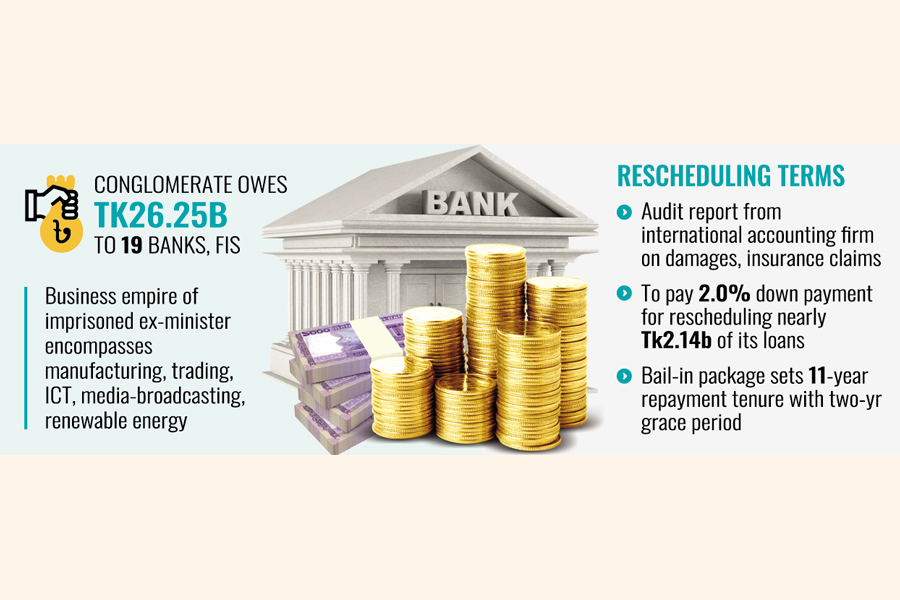After Nassa, beleaguered Gazi Group gets loan rescheduling facility

Published :
Updated :

Now the beleaguered Gazi Group is also getting special opportunity to reschedule its hefty default loans, officials say.
Pursuant to government policy update, the central bank's high-powered loan-rescheduling committee has asked the 19 commercial banks and financial institutions concerned to keep the banking transactions smooth and offer the rescheduling of its default loans, banking sources say.
In the bail-in package, the business conglomerate of imprisoned former minister Golam Dastagir Gazi is getting 11-year repayment tenure for its classified loans with two years of grace period, central bank officials recently told the FE.
This corporate comes close on the heels of another big business group for rehabilitation.
Recently, the government has also allowed Nassa Group, a garment-sector conglomerate-also in hot water with its owner held in jail for his role during the past regime--to get its nearly Tk 40-billion loan rescheduled in consideration of its contribution to the economy through export trade.
On its part, Gazi Group is asked to pay 2.0-percent down payment for rescheduling nearly Tk 2.14 billion out of its loans taken out from 19 banks and leasing companies.
According to the CIB report of the central bank, the group and its allied seven franchises owe Tk 26.25 billion in loans to these banks and financial institutions.
Established in 1974, Gazi Group has a wide range of production units and businesses, including in manufacturing, trading, ICT, media and broadcasting, and in renewable energy.
Its main production line boasts heavy-duty tanks and industrial pipes to high-performance auto-tyres and precision-engineered doors.
Major companies of the Gazi Group are Gazi International, Gazi Tanks, Gazi Pipes, Gazi Doors, Gazi Auto Tyres, Gazi Renewable Ltd., Gazi Television Ltd., Gazi Networks Limited, and Gazi Communications Limited.
The Bangladesh Bank's loan-rescheduling committee has given some terms and conditions for the corporate to avail the loan-restructuring facilities.
It has to complete an audit report from an international accounting firm on its damages stemming from the factory fire amid unrest following last year's student-mass uprising that unseated the Awami League government.
Its insurance claims will also have to be reflected in the report.
"Possible insurance claims, capability of the group's pre-fire and post-fire loan settlement and the capacity of mobilising fresh loans for running its business will have to be reflected in the report," a member of the committee told The Financial Express.
"We have also directed Shahjalal Bank, which has highest exposure to the group, to review the audit report and share that with other banks and financial institutions in a bid to facilitate loan-rescheduling procedure," he added.
The rescheduling committee has asked the banks to obey its recommendations within 3 months from the date of issuing letter.
The Gazi Group factory in Rupganj, Narayanganj, was set ablaze in late August 2024, following the arrest of its owner, former minister Golam Dastagir Gazi.
Marauders had looted the factory multiple times since early August, and the fire was a result of these attacks. The fires were fueled by inflammable materials like rubber and tyres, making it difficult for firefighters to control.
Allegations of many going missing were made, as rescue and recovery efforts were hampered by the fearsome condition of the building going up into flames.
The attacks on the factory followed the fall of the Awami League government on August 5, 2024, amidst widespread looting and arson at industrial sites.
According to the group, the now-interned minister, Golam Dastagir Gazi, started out producing plastic and rubber products. By 1980, the company had entered the tyre market, initially manufacturing rickshaw tubes.
Gazi Auto Tyres, established in 2002 in Rupganj upazila of Narayanganj, was the first manufacturer in import-dependent Bangladesh to produce tyres for commercial vehicles.
Over the years, Gazi Tyres, meeting 70 per cent of Bangladesh's demand for tyers used in rickshaws, three-wheelers and small commercial vehicles, became a cornerstone of the national economy, growing into a company valued at around Tk 20 billion and employing around 2,600 workers.
It also captured 15-20 per cent of the market share for bus and truck tyres, and up to 65 per cent in the minibus segment.
With a market value of Tk 15 billion, the company had set an ambitious target to manufacture 2.4 million tyres by 2025.


 For all latest news, follow The Financial Express Google News channel.
For all latest news, follow The Financial Express Google News channel.